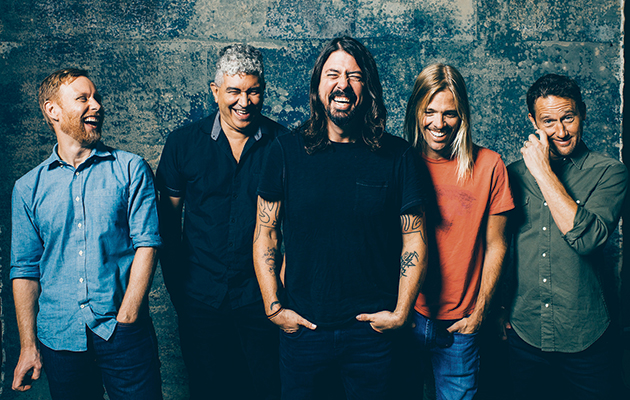A living refutation of the “stupid drummer” joke, Dave Grohl has moved from the back of the stage with Nirvana to the front of his own band, the insistent, enormously successful Foo Fighters. For the band’s most recent album, Sonic Highways Grohl moved somewhere less prominent again: behind the camera, becoming the producer/director/narrator of this ‘making of’ documentary with a difference.
Sonic Highways follows the Foo Fighters as they record tracks for their upcoming album in eight different American cities of musical note. Hang on, though. With quality research, first-hand knowledge gathered while schlepping around the country on tour, and an ear for both a scene and a good story, this becomes both a personal geography and an extremely engaging history lesson.
A case in point would be Chicago. It’s the home to Steve Albini’s Electrical Audio, which serves as a gateway into Albini’s enthusiasms, morality and history – not least with Nirvana. As you will already know, the city was also the laboratory of the electric blues, and duly Grohl (a scrupulous off-camera interviewer) gets brilliant, brilliant stuff from Buddy Guy, who tells an anecdote about Muddy Waters that will leave you beaming helplessly. The long-haired contextual authority is played by Rolling Stone’s David Fricke, while celeb pals provide additional colour.
Studios are more interesting than you’d think, it turns out. In New York, Fricke recalls walking past Electric Lady, the bespoke facility of Jimi Hendrix, complete with – as Gene Simmons explains – underground river. Jimmy Iovine, the face of the modern record business, recalls being the second engineer on Record Plant recordings, and how he came to be called “Jimmy Shoes”. Bowie is present anecdotally, via James Murphy.
Steve Rosenthal runs New York’s Magic Shop, a sonically-perfect cupboard in Hell’s Kitchen, which has hosted recordings by Lou Reed, Patti Smith, Ramones and other local acts. When the boyband wave broke in ’98, the studio, with its Neve console, didn’t try to compete, but went deeper into what it loved – launching a sound restoration business which has since performed Lazarine work on historic recordings by the likes of Woody Guthrie. Might Nora Guthrie on hand to speak movingly on this topic, by any chance? Oh, of course, there she is.
There are, in among these joys, it must be added, the sequences during which Foo Fighters go through the process of recording their new compositions, and then play them in a full-tilt Reading Festival manner rather at odds with the sensitive work that we’ve been watching. Nor can Grohl can’t quite subdue his urge to clown cleverly in situations that excite him. In such moments he seems a little too pleased with himself, but then if you were him, watching this, you’d have every reason.
EXTRAS: extended interviews with Barack Obama, Dan Auerbach, Chuck D, Billy Gibbons, Gibby Haynes, Joan Jett, Ian Mackaye, Dolly Parton, Carrie Underwood and Joe Walsh.



